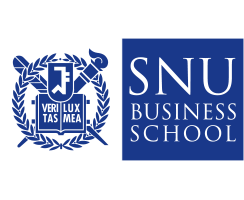SNUbiz News
Tackling the Challenge of Quantifying Mental Health: Interview with CEO Sang-yoon Bae and Yong-geun Song of Risorius

Sang-yoon Bae, the CEO of Risorius, entered the College of Medicine at Seoul National University in 2019 and organized a team to launch a technology-based startup focused on analyzing mental health objectively and is running the company with Yong-Geun Song, who entered the College of Medicine at Seoul National University in 2020 and is responsible for the company’s management strategies. Risorius was recognized as the best team at the Third Weird Idea Competition, hosted by the Venture Entrepreneur Center, and the 2024 Startup Convention (Entrepreneurship Competition). The company, now a corporation, is actively engaged in R&D and sales activities to expand its business on a global scale.
1. Please introduce “Risorius” to us!
Risorius is a tech-based startup founded to quantify mental health indicators. Just as you can check your health status through quantified data, such as blood sugar levels and blood pressure, we are developing analysis methods that systematically measure mental health status, including depression, cognitive functions, and concentration rates. Currently, one’s mental health status is evaluated through questionnaires or counseling, and there is a lack of objective, data-driven analyses. Risorius aims to objectify mental health indicators using biometric data and data analysis techniques and to run a business based on this technology.
2. What inspired you to become an entrepreneur?
The inspiration for Risorius came from the limitations I experienced in research. I was an undergraduate researcher for two years, during which I published papers but felt disillusioned because the research findings did not lead to solutions for the problems. After realizing that actual problem-solving in medical research mainly takes place in the industrial sphere, I was drawn to entrepreneurship. Utilizing your idea to address problems in the field is the essence of entrepreneurship, and I wanted to see my research findings reflected in the field by founding a company.
3. How did you start “Risorius”?
Risorius is a student startup founded by medical students and engineering students that initially began as a project team. Our leader networked to create the team, and we grew as a company with financial support from the government. There were many challenges along the way, but we could take the leap and overcome new obstacles because it was our first time, and we were fearless. We have come this far by learning from our experiences and gradually evolving into a business. A year has passed since we launched our company, and we are striving to establish a corporate system and grow further.

4. What were the challenges of starting your own business, and how did you overcome them?
Every moment after establishing Risorius presented one challenge after another. There were times when unexpected data analysis results came out in the R&D process or when we received unexpected responses while designing our product service. There were also many hassles we had not considered before starting the business, such as the paperwork required to incorporate the company, which became a burden for us. To overcome such challenges, we consulted with experts or sometimes addressed the issues directly. One of the psychological challenges was the frustration we experienced when the project timeline did not proceed as planned and the anxiety of managing the funds. To tackle these problems, we created a realistic timeline, regularly checked our funding status, and established plans B, C, and D, which helped us find peace.
5. What are the management and profit models of “Risorius,” and what are your future strategies?
Risorius has a dual-structured business model with short-term and mid- to long-term goals. In the short term, we are developing wellness products based on biometric data analysis technology to secure stable revenue and data references. We are also preparing to launch a device for analyzing cognitive functions and emotional states using brainwave measurement. In the mid-to-long term, we plan to enter the insurance market to improve the insurance loss ratio based on mental health-related data. Additionally, we are developing an Insurtech service to expand the insurance market for patients with mental illnesses. The profit model of Risorius is based on B2B and B2G, and we are engaging in sales activities both in Korea and internationally. In particular, when approaching global markets, we establish sales strategies with general distributors, and currently, we are running two-track product development and R&D projects.
6. What is your company’s vision and your personal vision?
Risorius’ vision is to apply and expand the technology to quantify mental health indicators across various industries. Our goal is not to limit ourselves to the wellness and healthcare industries but to provide products and services using technology to quantify mental health indicators to various sectors across society. To this end, we plan to form multiple partnerships and collaborations to achieve efficient growth. I hope to maintain the company’s financial stability and support my team members so they can do their jobs easily.
The Stories from the Entrepreneurship Center section features interviews with current and former students majoring in Business Administration in Entrepreneurship, as well as startup teams that participated in the Center’s programs, sharing the journeys of young entrepreneurs. If you are interested in this section, please send emails to snustartup@snu.ac.kr.?


